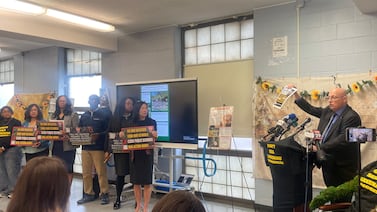Chalkbeat reporters file thousands of words every day, and every single one of those words is carefully chosen. Our reporters take their time to think of the perfect phrase or description, writing and rewriting to tell accurate, trustworthy education stories.
As Chalkbeat’s managing editor for style and standards, I work with the team of outstanding story editors who shape each story and make sure it conforms to Chalkbeat style. Because we always want to be transparent with our readers, I thought I’d explain some of our style choices and why our style evolves as the news cycle — and society — changes.
You probably have heard of the Oxford comma — that’s the second comma in the phrase “red, white, and blue.” That’s one example of style, but style goes beyond grammar, punctuation, and spelling.
Style also encompasses the language we use to describe the people we write about and for. Sometimes we need just one word to identify someone: “superintendent” or “student,” for example. We include race, ethnicity, religion, sexual orientation, or gender if it’s relevant to the story we’re telling, and it’s important we get all of that language right. We never assume — we always ask people to self-identify.
We are careful never to “other” anyone by using a description that separates or denigrates them. Instead of using a label to identify someone with a disability or illness, Chalkbeat uses people-first language. So instead of saying someone suffers from or is afflicted with Parkinson’s, people-first language describes them as a person with Parkinson’s. People-first language also applies to pronouns. If someone identifies as gender nonbinary and uses the pronouns they/them/theirs, we honor those pronouns and use them.
Like our reporting, the language we use is evolving as the world changes. A year ago, none of our reporters had heard of coronavirus or had written a deep dive on school air circulation. When we need to add terms such as COVID-19 or distance learning, the story editors discuss each one and often ask for opinions from throughout Chalkbeat. When we want to add a term describing race, ethnicity, or gender identity, we look to organizations such as NABJ, NAHJ, or NLGJA for guidance.
In June, after George Floyd’s death, Chalkbeat added antiracism to our list of core values, promising that by committing to antiracism we can “offer stronger, more honest coverage, and build more trust with our readers.” As we reflected on what that meant with respect to language, we decided to capitalize the word Black when describing race, people, and culture, giving the term and the people and culture it describes as much weight and respect as when we capitalize the words Indigenous or Latino.
The emergence of the term Latinx is another example of language evolution, but in this case, Chalkbeat has held back on adopting the descriptor.
The newish term is meant to be inclusive of all Latino/Hispanic ethnicities and gender identities. (The Spanish language has feminine and masculine words, and Latino is masculine.) But a recent Pew study found that only 3% of U.S. Latinos/Hispanics use the term, and we don’t want readers to be confused. If someone self-identifies as Latinx for a Chalkbeat story, we honor their choice and include an explainer.
As language continues to evolve, so will our style guide at Chalkbeat. And we’ll continue to tinker with every word in every story and have deep conversations — even healthy disagreements — about language choices. Those choices go beyond individual sentences or even stories. They reflect our culture and our values.







